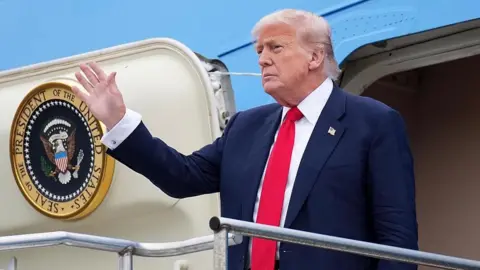Donald Trump’s recent visit to Scotland, which commenced with his arrival at Prestwick Airport, has sparked considerable attention both domestically and internationally. The former U.S. President, who commented on his positive feelings about returning to Scotland, indicated his plans for a four-day private trip that is set to include leisure and meetings with significant political figures. Upon his arrival just before 20:30, he was warmly greeted by key personalities, including Scottish Secretary Ian Murray and Warren Stephens, the U.S. Ambassador to the UK.
Once the motorcade departed the airport, Trump aimed for his luxurious golf resort in Turnberry, located in South Ayrshire, where he is expected to indulge in a round of golf on Saturday. During a brief interaction with journalists before leaving, Trump expressed his thoughts about the UK’s political landscape, particularly about Sir Keir Starmer, the leader of the Labour Party, whom he is scheduled to meet on Monday. Trump described Starmer as a “good man” and acknowledged the significance of the recent trade deal that Starmer had achieved after years of negotiations.
Adding to the agenda of this trip, Trump also intends to engage with John Swinney, Scotland’s First Minister. Swinney has emphasized his dedication to advocating for Scotland’s interests during this visit, and Trump reciprocated this sentiment by referring to Swinney as a “good man.” This meeting is expected to delve into themes of business relations, Scottish representation on international issues, and local economic prospects.
As the president arrived at the Turnberry resort, he was accompanied by an extensive motorcade consisting of more than two dozen vehicles, securely monitored by Police Scotland and ambulance units. However, the arrival was not without a juxtaposition of presence, as a small group of protesters gathered nearby to express their dissent. This visit is part of a larger tour that will eventually lead Trump to his second property in Aberdeenshire, where he plans to inaugurate the new 18-hole course at Menie.
In his dialogues, Trump also proactively addressed the European landscape, particularly voicing his concerns regarding migration and wind energy practices in the region. He was notably critical of the proliferation of wind farms, mentioning, “You’re ruining your countries,” pointing out effects on landscapes and wildlife. This criticism of wind energy comes with context, as Trump’s previous business dealings have placed him at odds with wind projects in Scotland that he believes adversely affected the view from his golf courses.
The visit is not simply a leisure trip; it’s also an opportunity for Trump to reestablish connections and to influence discussions related to transatlantic trade relations, having confirmed a meeting with European Commission President Ursula von der Leyen during his stay. Notably, Trump is expected to return to the United States on Tuesday and has plans for another state visit to the UK in September.
Preparations for Trump’s visit have been extensive, involving a major security operation in South Ayrshire and Aberdeenshire. Police presence has been heightened, and several road closures and diversions have been established around Turnberry and the Menie site to ensure security and control over the events that are set to unfold. While the local response to his visit seems mixed, with both supporters and opponents rallying, the overall atmosphere reflects an intricate web of international interest and local sentiment surrounding the controversial figure of Trump.
Trump’s connection to Scotland is further underscored by his familial roots; his mother, Mary Anne MacLeod, was a Gaelic speaker from the Isle of Lewis and immigrated to the U.S. during the Great Depression. Her heritage enhances Trump’s personal connection to Scotland and perhaps influences his perspectives during this visit, which aims to solidify business and political relationships in the UK. As this trip progresses, it’s clear that Trump’s presence in Scotland invites a blend of political maneuvering, local protest, and robust discussion on the future of international relations.











